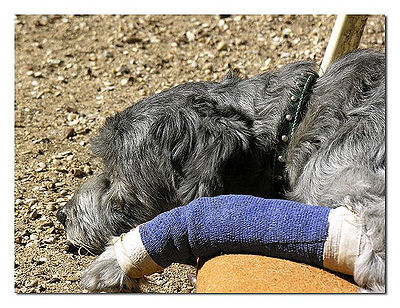Diarrhea is a common complaint with pets. Our pets sometimes eat things that are not good for them. They may be on medications such as antibiotics that cause diarrhea. It can be related to changes in food, allergies, diseases. Whatever the reason it should be taken seriously and treated. An obvious symptom is frequent loose […]
Diseases Affecting Multiple Species

Rabies
Rabies is a deadly virus transmitted by a bite from an infected animal. Rabies is rare in the United States thanks to the program of vaccination. However, if you have been bitten by a stray dog, cat or wild animal such as a raccoon, skunk, fox or bat, go to an emergency unit immediately. Rabies, […]

Vestibular Disease
Vestibular Disease can affect humans and dogs and cats as well as other mammals too. The vestibular system helps our body to navigate the earth. It allows our eyes, hands and legs know how to move, preventing falling. We are able to navigate on all types of terrain without dizziness or nausea. The most common […]

Spondylosis in Pets
Spondylosis is a degenerative disorder meaning it grows worse with time. It causes loss of spinal structure and function. Bone spurs (osteophytes) form at the edges of vertetrae, sometimes forming bony bridges between them. Usually, the lower back is affected, but it can occur in the neck and anywhere along the spine. Spondylosis is an […]

Osteochondrodysplasia
Osteochondrodysplasia is the term for a number of disorders where there is malformation and growth of cartilage and bone. Osteo means bone, chondro is cartilage and dysplasia is abnormal development. It is a hereditary disorder resulting in abnormal skeletal development. Deformities that occur often result in shortened limbs. In severe cases, surgery is often necessary […]

Histoplasmosis
Cats, dogs and humans can be infected with Histoplasmosis, a fungal disease. The fungus, Histoplasma capsulatum, is found in soil mainly in humid areas particularly near bodies of water. Outdoor cats and dogs are more prone to histoplasmosis, especially hunting dogs who travel over all sorts of terrain. While infection can occur at any age, […]

Signs of Heart Disease in Dogs and Cats
Just as in humans, the heart of a pet is muscle consisting of four chambers. Valves separate the chambers preventing blood from flowing back. Blood is sent to the lungs where it receives more oxygen and then travels throughout the body. If dogs develop heart disease, it is usually in the valves, occasionally in the […]

Myositis in Animals
Myositis is the the inflammation of one or more muscles. In its many forms it can affect all living creatures. It can be difficult to diagnose and is painful and usually indicates an underlying illness. While there are different forms of myositis, the most common is masticatory myositis involving the muscles used for chewing. There […]

Lipomas
The majority of lipomas are benign fatty tumors. They usually occur in older or overweight pets. They are mainly located in the subcutaneous tissue (beneath the skin) and are painless. They move slightly under your touch. Unless the lipoma is in a part of the pet’s body making him/her uncomfortable or restricting movement, most veterinarians […]

Lenticular Sclerosis
Lenticular Sclerosis, also known as Nuclear Sclerosis, affects older pets, cats at about 9 years old and dogs at about age 7. It occurs due to the hardening of the lens of the eye as the pet ages. The structure of the lens of the eye changes continuously. New layers are formed over existing ones […]

